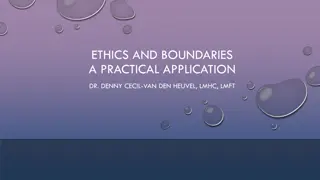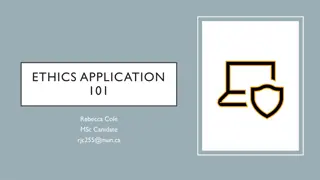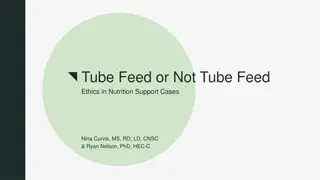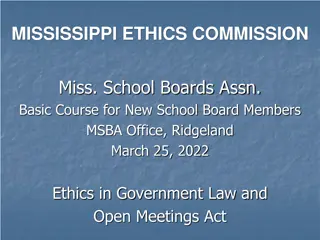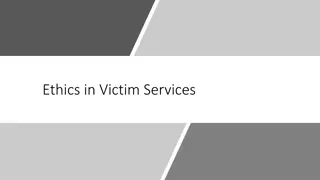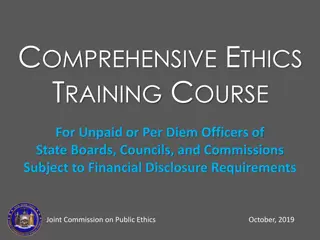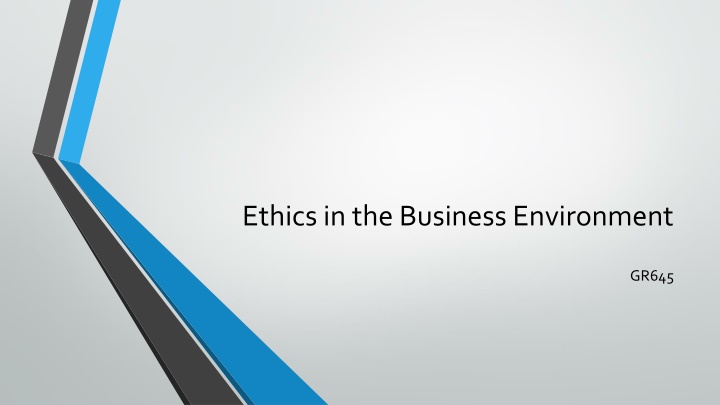
Business Ethics and Corporate Culture
This content delves into the significance of business ethics, the correlation between ethics and compliance with the law, examples of ethical decision-making in consumer behavior, and the role of an ethical corporate culture. It emphasizes the importance of ethical decision-making in the business environment and the need for due diligence and risk assessment for legal compliance and ethical behavior.
Download Presentation

Please find below an Image/Link to download the presentation.
The content on the website is provided AS IS for your information and personal use only. It may not be sold, licensed, or shared on other websites without obtaining consent from the author. If you encounter any issues during the download, it is possible that the publisher has removed the file from their server.
You are allowed to download the files provided on this website for personal or commercial use, subject to the condition that they are used lawfully. All files are the property of their respective owners.
The content on the website is provided AS IS for your information and personal use only. It may not be sold, licensed, or shared on other websites without obtaining consent from the author.
E N D
Presentation Transcript
Business Ethics What is Business Ethics? Why is it so important?
Compliance with the law is just the baseline for effective and responsible managerial action. Why we study ethics & law together Legally astute managers consider not only what the firm can do but also what it should do. C. Roland Christennsen et al., Business Policy: Text and Cases 121 (6th ed. 1987)
WSJ Study The Results WSJ showed consumers the same products, coffee and T-shirts. WSJ told one group the items had been made using high ethical standards and another group that low standards had been used. Consumers were willing to pay a slight premium for the ethically made goods. But they would buy unethically made products only at a very steep discount.
Business Ethics Business ethics is a branch of philosophy that applies to ethical decision making in the business environment. Classical ethical principles apply to ethical dilemmas to broaden the discussion and strategy of its resolution. Reasonable people can view an ethical problem from different ethical perspectives.
Ethical Corporate Culture An ethical corporate culture is an ongoing development of the company s values and legal compliance. Stakeholder analysis is an important function within this process. Not all stakeholders are treated equally. 7
What Does Doing the Right Thing Mean? What is the right thing to do? How is that determined? Could reasonable people come to different conclusions about what is right or how to do it? 8
Due Diligence and Risk Assessment Due Diligence Extensive method of legal review to ensure legal compliance. A corporate culture must first be in legal compliance before it can be ethical. Constantly train business executives and managers to prevent illegal acts. Risk Assessment Reviews a wide range of potential business losses to the company. Take steps to reduce risks
Code of Conduct & Ethics Enumerates and explains a company s values. Required for publicly traded companies. Should be explained to employees along with consequences for violations. Example Google s Code of Conduct: The core message is simple: being a Googler means holding yourself to the highest possible standard of ethical business conduct. Read and Reread core principles won t change but specifics might.
The Code of Conduct Two Types of Codes of Conduct: External Supplier Codes of Conduct for those one is doing business with Internal Code of Conduct Broad range of issues Statement of Core Values & Purpose Discrimination Harassment Data Privacy Whistleblowing System
Compliance & Ethics Programs A living, ongoing process that is part of the fabric of the organization. Must be a commitment to an ethical way of conducting business and a system for helping individuals to do the right thing. Legally required for publicly traded companies. Existence can be used to possibly reduce fines and/or prison sentence of company executive.
Compliance & Ethics Programs A compliance and ethics program is a strategy adopted by the board of directors to assure, as much as is reasonably possible, legal and ethical compliance. It consists of due diligence and risk assessment and an effective training program. A chief ethics and compliance officer oversees the compliance and ethics program. 13
Chief Ethics and Compliance Officer Constantly reviewing any risks associated with a business venture including potential civil or criminal liability for wrongful company conduct along with ongoing due diligence to ensure legal compliance. Report to the CEO. Run training programs.
What is ethical theory? Ethical theory is based on the writings of specialists in the discipline of ethics that is a branch of philosophy. Ethicists are found in Western and Eastern philosophy. U.S. Constitutional laws often are based on ethical theory. (e.g. due process , equal opportunity , equal rights and privacy are all rooted in our common human dignity that has a philosophical and ethical origin.)
Approaches to Ethical Reasoning Deontological Duty Based Look to the motivation and principles behind the action. Do what you ethically ought to do regardless of consequences. Teleological Outcome Based Seek the act with maximum value. Look to consequences. How do the consequences affect the common good? A particular action can be evaluated differently depending on the system by which it is evaluated.
Virtue Ethics Teleological. Relates to the character traits and virtues of a business executive. Not a concrete series of ethical principles but a virtuous disposition, induced by good habits, to develop appropriate attitudes about ethical behavior. Application of justice to business decisions more concern about stakeholders. Aristotle 384 BC 322 BC
Natural Law Teleological theory. Law should conform to objective principles of fundamental rights that assures equality for all, regardless of their culture or customs. All people have an innate duty and ability to make rational decisions that should be used in resolving ethical disputes. Practical danger of natural law is that it may discourage reliance on the rule of law. St. Thomas Aquinas 1226 - 1274
Natural Law is Self-Evident Declaration of Independence UN Declaration of Human Rights
Natural Law and Reasonableness Rich diversity in moral life. Avoiding moral relativism: carefully review facts and give a scientific reason why one argument is stronger than another (expert testimony). Jury makes a collective decision as to reasonableness. Natural Law is an integration of law and ethics.
Universalism Immanuel Kant (1724-1804) Categorical Imperative Deontological. Ethical conduct is the dutiful thing to do regardless of consequences. I ought never to act except in such a way that I can will that my maxim should become a universal law Act so that you always use humanity, in your own person as well as in the person of every other, never merely as a means, but at the same time as an end in themselves. Conduct worthy of universal imitation.
Kants Categorical Imperative Act only on that maxim whereby thou canst at the same time will that it [your action] should become a universal law. Act so that you always use humanity, in your own person as well as in the person of every other, never merely as a means, but at the same time as an end in themselves. 22
Utilitarianism John Stuart Mill (1806 1873) Jeremy Bentham (1748 -1832) Teleological - The greatest good for the greatest number. Jeremy Bentham and John Stuart Mill Act-Utilitarianism concerned with the consequences of an act on society. Calculated at time of execution. Never take any action that does not result in greater good than harm for your society. Rule-Utilitarianism laws should be concerned with the long range benefits and consequences of the rule on society. Act only in such a way that your rule is based on what produces more benefit than harm to society.
Applying Utilitarianism Applying this theory requires: Determination of which individuals will be affected by the action in question. A cost-benefit analysis which involves and assessment of the negative and positive effects of alternative actions on these individuals. A choice among alternative actions find that which will produce maximum societal utility. A pragmatic philosophy especially useful for difficult decisions such as massive layoffs to keep a company is business.
Prima Facie Duties W.D. Ross Deontological theory. There are special obligations to behave a certain way because we have inherent duties to perform regardless of the consequences. Prima Facie Duties: Duty of Fidelity - promise-keeping Duty of Reparation Compensate for injuries Duty of Gratitude obligation when benefit received Duty of Non-malfeasance Duty not to cause harm to another Duty to Prevent Harm Statutes that prohibit discrimination Duty of Beneficence Enhance well-being of others (ADA) Duty of Self-Improvement Duty of Justice Duty to distribute societal benefits fairly
A Theory of Justice John Rawls (1921-2002) Deontological Theory. John Rawls (1921-2002) Equal Liberty Principle equal rights to the most extensive basic liberty. Difference Principle social and economic inequalities are to be arranged so that they are: (1) to the greater benefit of the least advantaged (2) favoring an equality of opportunity for all
Aristotle (384322 BC) Virtue Ethics: Teleological St. Thomas Aquinas (1226 1274) Natural Law: Teleological Immanuel Kant (1724 1804) Categorical Imperatives: Deontological Summary of Philosophers and Ethical Theories Jeremy Bentham (1748 1832) Utilitarianism: Teleological John Stewart Mill (1806 1873) Utilitarianism: Teleological W.D. Ross (1877 1971) Prima Facie Duties: Deontological John Rawls (1928 2002) A Theory of Justice: Deontological
The Intersection of Law & Ethics Law Ethics Judge or Jury may assess ethical character. Law often an expression of societal norms regarding appropriate behavior Law defines a business manager s role and duties Over time unethical behavior may lead to illegal behavior Over time unethical behavior may lead to government regulation.
The Nature of a Corporation Legal entity that has an identity distinct from that of its owners. Considered a legal person. By the 1900s, the notion that a corporation existed for the purpose of making money for its shareholders was taking hold.
Corporate Stakeholder Theory Stakeholder Theory was a term made popular by R. Edward Freeman in 1984. Stakeholder = any individual or group that can affect or is affected by the achievement of an organization s objectives. Consider customers, employees, vendors, suppliers, the community, and the environment.
Social Enterprise Movement Using private enterprise to help remedy social ills. Examples: Ben & Jerry s, Newman s Own, Seventh Generation, Tom s of Maine.
Conscious Capitalism Acknowledges the benefits of the free-enterprise capitalist system. Advocates the position that corporations have a greater interconnectedness to society than ever before and, therefore, have a corresponding obligation to be more conscious in their decision making. Whole Foods is an example of Conscious Capitalism in action John Mackey and Raj Sisodia Conscious Capitalism Is Not an Oxymoron
Corporate Social Responsibility Jen Boynton How the Voice of the People Is Driving Corporate Social Responsibility Pressure of Social Media Be conscious of who is in charge of your company s social media, and what you want to communicate Companies need to be proactive, and personal, by listening to feedback and responding in an authentic way Success in communicating your company s brand and goals Sustainability and consumer engagement Interactive communication Truly listen to complaints and complements

